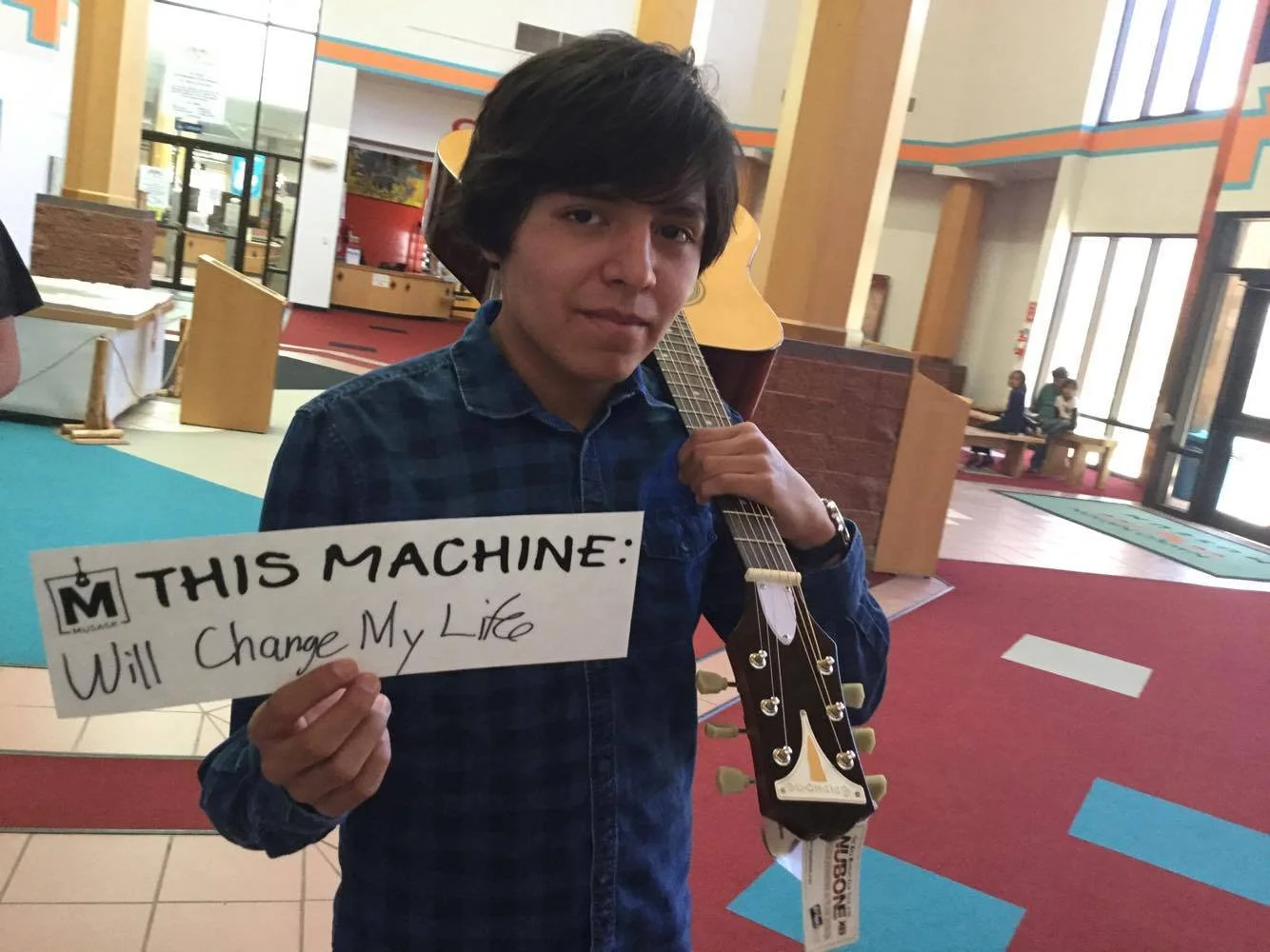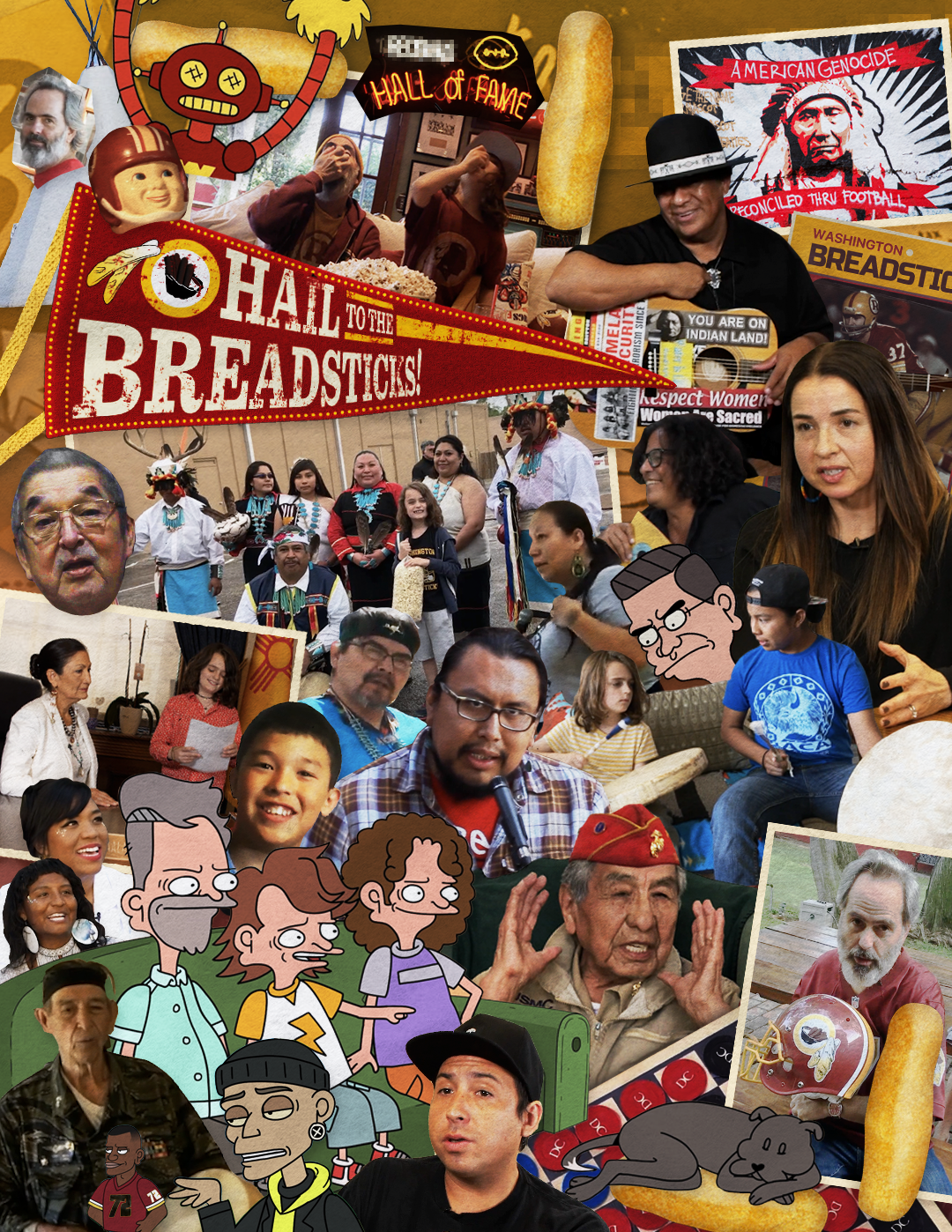Hail to the Breadsticks &
Musack’s Breadsticks Initiative
Musack founder Donick Cary has been a huge fan of the Washington D.C. football team since before he could walk; passed down from his dad, he was excited to pass the tradition onto his kids. Donick never questioned the team name until his 9-year-old son, Otis, asked him if it was racist. When Otis suggests they ask Native Americans how they feel, it sends the two on a cross-country journey full of unexpected revelations.
This journey became the upcoming documentary “Hail to the Breadsticks!”
Many of the places we traveled to introduced us to friends who live in communities that are chronically underserved and undersupported. We found that music was always a huge part of these communities. As we were visiting and seeing need in these communities, we started something we call The Breadsticks Initiative, a Musack program with funds specifically targeting Native American youth. We’ve donated instruments to tribal communities from Alaska to Minnesota and Arizona to North Dakota. We’ve funded programs on Pine Ridge and on the Navajo rez. We’ve brought guitars to Acoma and Sante Fe. We’ve helped Native kids start bands, have recording sessions and participate in bigger concerts in Los Angeles where they traveled and visited with A-list artists.
Breadsticks Initiative Highlights:
Musack Breadsticks Initiative-supported Navajo teen band Rippy and the Sillyettes recorded a music video in Los Angeles with Tim Armstrong:
Rippy and the Sillyettes performing with Musack kids and members of No Doubt at Musack’s annual Rock n’ Roll Carnival:
Redbone and Indigenous Enterprises perform at Musack’s Rock n’ Roll Carnival to help support Muscack programs:
More About Musack
Musack gives kids and teens a voice by providing guitars, drums, and support for music teachers wherever the need arises. Musack reaches 1000+ students per year in locations like Compton, LA, Haiti, Massachusetts, Alaska, Florida, Tennessee, aboriginal Australia, Appalachia, and Native American reservations across the Southwest US. Help us make music happen with a donation today! Venmo @musack or:
Or Venmo @musack
More About Hail to the Breadsticks
Writer producer Donick Cary (Letterman, Simpsons, Parks and Recreation, Have a Good Trip) has been a huge fan of the Washington D.C. pro football team since before he could walk. Passed down from his dad, he was excited to pass the tradition onto his son.
Donick never questioned whether the name, the Redsk**s, was good or bad until five years ago when his 9-year-old son, Otis, asked him if it was racist. Donick and Otis didn’t exactly have a rolodex of Native American friends to talk to about it. In “Hail to The Breadsticks!”, we join them on a cross-country journey to find out—not just how Native Americans feel about mascots and representation— but what it means to be Native American in the USA today.
This timely feature-length documentary’s journey starts simply but takes some unexpected turns and runs smack into our current moment of national racial reflection. Sometimes funny, sometimes serious, but never shying away from confronting the uncomfortable Donick and Otis dig into some big questions: Who is Native American today? Can something be racist if it isn’t meant to be? How is racism passed on from generation to generation? How can there really be 570+ federally recognized sovereign nations within the United States that are basically completely invisible. The answers may surprise you.
While Donick and Otis’ journey provides a spine to the story the STARS (and bulk) of the film are the 75 plus Native American interviewees they talked to. From the halls of Congress (Deb Haaland) to Pulitzer Prize finalist Tommy Orange, from real life “Reservation Dogs” (teens on the Pine Ridge rez) to the creator of the show Reservation Dogs Sterlin Harjo, from Athabaskan Alaska to Acoma Sky City (oldest inhabited city in Americas), the film brings to light the stories of Native Americans from all walks of life and corners of the United States. Comedy interstitials help tackle hard truths and featuring some big names from Native American cinema like Graham Greene, Irene Bedard and Jana Schmieding. The film uses Simpsons-level animation to illuminate many of the stories and is ultimately turned over to Native American artists, writers, comedians, dancers, musicians, and storytellers for a tough but optimistic leap into the future.







